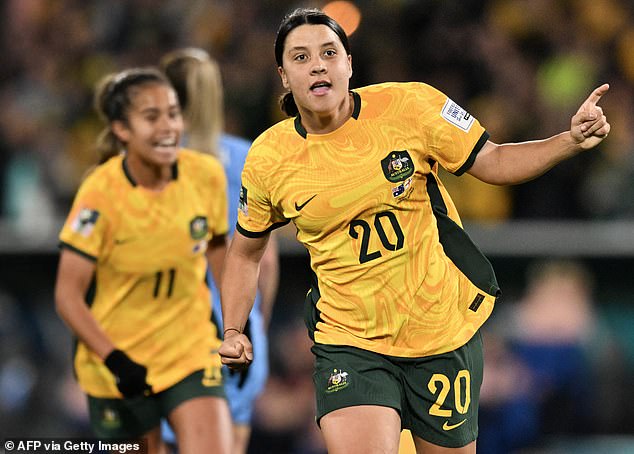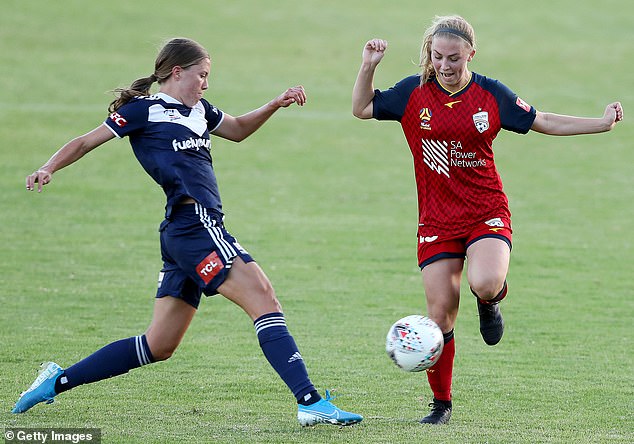‘Toxic’ culture of Australian women’s football again under the spotlight – as fresh initiative is launched to ensure player safety and wellbeing
More than three years after shocking revelations about a “toxic” culture at the Matildas, Professional Footballers Australia has launched a new initiative to protect the rights and welfare of all professional players.
The Safe Football Project aims to ‘establish professional football as the safest sport for women in Australia by providing a platform to better identify, address and remedy incidents and risks of abuse and harassment’.
In 2021, former Matildas star Lisa De Vanna shocked the football world by revealing incidents of sexual harassment, grooming and bullying during her storied career.
Further research found that Australian football is ‘falling short’ when it comes to player safety and wellbeing at all levels.
As a result of De Vanna’s claims, Sport Integrity Australia investigated a number of claims and referred three cases to police. However, the majority of the claims were deemed beyond their scope for investigation.
Now, through the Safe Football Project report, the PFA has called for a ‘comprehensive review of current safeguarding frameworks’, with a focus on ‘power dynamics, organisational culture, player voice, coach education, remediation, policy evaluation and bystander intervention’.
The project, which is still in development, aims to increase capacity to respond to abuse within football and ‘proactively protect players’.
“A safe workplace is a human right,” said Kathryn Gill, co-director of PFA.
In 2021, former Matildas star Lisa De Vanna shocked the football world by revealing incidents of sexual harassment, grooming and bullying during her decorated career

Players such as Sam Kerr and Mary Fowler (both pictured) have stated that they flourished as footballers in the Matildas’ environment

A 2023 survey conducted by the Safe Football Project on behalf of Professional Footballers Australia found that 16 percent of 172 players surveyed experienced some form of abuse (pictured during an A-League women’s match).
‘The safety and wellbeing of our members at work is our number one priority. However, the project has shown that Australian football, like most sporting competitions, is falling short.
‘We activated the Safe Football Project not only in response to the failures of the past, but also to encourage everyone involved in the sport to proactively address these serious and confronting challenges.
‘The next step is to work with all stakeholders in Australian football to implement the best protection measures tailored to the people they are intended to protect – the players.
‘I would like to thank the many players who have been so active in developing the project and the courageous women who have spoken openly about their experiences of abuse and harassment in the hope of being a catalyst for change.’
A survey of 172 female players in the 2023 A-League women’s competition found that 16 percent reported having been victims of abuse in some way.
The project’s objectives include establishing an independently run ‘landing ground’ where players can anonymously share concerns, player education initiatives to raise awareness of their rights and the creation of a charter of rights that would be displayed in each club’s dressing room.
The PFA has also engaged Kat Craig, a human rights lawyer with extensive experience in sexual abuse, harassment and trauma, to provide expert support in developing the project.
Western United star Grace Maher tweeted her support of the PFA initiative on Tuesday.
“A first step in implementing real change so players can thrive in their workplace,” she posted on X.
A-Leagues commissioner Nick Garcia said the men’s and women’s professional leagues will soon introduce their own updated player protection mechanisms.
“We are excited about this project and look forward to working with the PFA, clubs and other football stakeholders to improve the environment for all players, coaches and staff,” he told the ABC.
‘The launch of this project coincides with the final stages of the development of the APL Safeguarding Framework.
‘We hope that these, together with the club and venue policies and the Safe Football Project, are further proactive steps to make our sport a safe place for everyone.’
